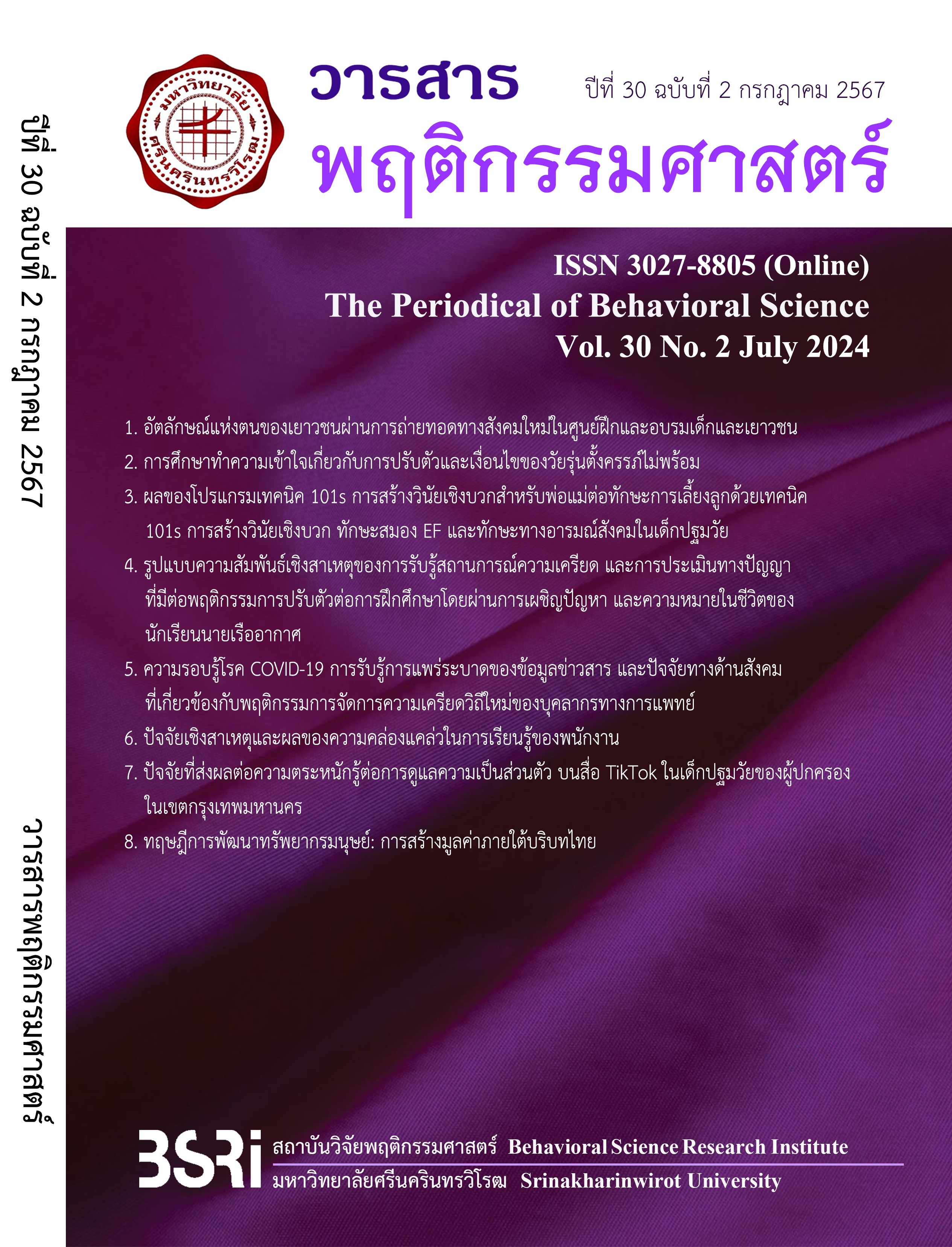A Study to Understand the Adaptation and Conditions among Unintended Pregnancy Adolescents
Keywords:
Unintended pregnancy adolescents, adaptation, conditionAbstract
This study the objectives was as follow to understand the adaptation and the condition of adolescents with unintended pregnancies to adapt to crisis situations. The qualitative research consists of collecting in-depth data through interviews from a primary data source, five adolescents who have unplanned pregnancies. The findings revealed the understanding of adaptation: (1) physiological mode, which includes appropriate food intake, sufficient rest and sleep, proper physical management, observation of complications and adherence to prenatal appointments; (2) self-concept mode, which involves self-esteem, self-confidence, and optimism; (3) role function mode, which includes a specific focus on commitment towards the child, responsibility and seeking information on being a new mother; and (4) interdependence mode, including helping each other. As for the understanding of the conditions faced by adolescents with unintended pregnancies enabled them to adapt to crisis situations, involves accepting reality, facing challenges, and receiving encouragement.
Downloads
References
Andrew, H. A., & Roy, C. (1991). Essential of the Roy adaptation model. In S. C. Roy & H. Andrew (Eds.). The Roy adaptation model: The definitive statement. Connecticut: Appleton & Lange.
Department of Health. (2021). Situation of reproductive health in adolescents and young people. Bureau of Reproductive Health Ministry of Public Health. [in Thai]
Glover, V. (2015). Stress: Effects on Neonatal and Child Development. Elsevier.
Hamtyat, A. (2015). The adaptation of the adolescent mothers [Doctoral dissertation]. Department of Education and Social Development, Burapa University, Chonburi. [in Thai]
Jeungklinchan, P. (2013). Adapting process and child rearing in teenage single mothers: A case study of sahathai foundation’s clients [Master’s thesis]. Srinakharinwirot University, Bangkok. [in Thai]
Kittiyodom, S. (2012). Maternal Youth and Pregnancy Outcomes: Early and Middle adolescent Versus Late Adolescent Compared with Women beyond the Teen Years. Journal of Regional Health Promotion Centre 5, 7(16), 62-74. [in Thai]
Lertsakornsiri, M. (2013). Associated with Unwanted Adolescent Women Pregnancy in the Perceived of The First Year Students at Saint Louis College. Journal of the Royal Thai Army Nurses, 15(1), 90-98.
Lowdermilk, D. L., & Perry, S. E. (2006). Maternity nursing (7th ed.). Mosby.
Miles, M. B., & Huberman, A. M. (1994). Qualitative Data Analysis: An Expanded Source Book. Sage.
Muakmanee, K., & Limsaku, M. (2020). Adjustment of Adolescent Mothers to Maternal Role: A Case Study of Rak Dharun Clinic, Suratthani Hospital. Journal of Social Work, 28(2), 60-85.
Narongrit, A., Sabaiying, M. (2018). Adaptations Resulting from Unwanted Pregnancy among Students: A Case Study of a Province in the Southern Part of Thailand. Academic Journal of Humanities and Social Sciences, 50(26), 313-337.
Schetter, C. D., & Tanner, L. (2012). Anxiety, depression and stress n pregnancy: Implications for mothers, children, research, and practice. Curr Opin Psychiatry, 25(2), 141-148.
Sukcharee, P., Silawan, T., & Phachuen, O. (2001). Adolescent mothers' perspectives on teenage pregnancy Kantharawichai District Maha Sarakham Province. The 1st National Community Health System.
Thaneepanichsakul, S. (2012). Unwanted pregnancy in perinatal medical practice crisis. P. A. Living.
Thatsananchalee, P., Peungposop, N., & Janprasert, T. (2016). Life Management in Unintended Pregnancy Crisis of Adolescent Girls Living in the East Province. Journal of Behavioral Science for Development, 8(2), 251-266.
WHO. (2020). Adolescent Demographics. https://www.who.int/data/maternal-newborn-child-adolescent-ageing/adolescent-data/adolescent---demographics
Downloads
Published
How to Cite
Issue
Section
License
Copyright (c) 2024 The Periodical of Behavioral Science

This work is licensed under a Creative Commons Attribution-NonCommercial-NoDerivatives 4.0 International License.
Behavioral Science Research Institute, SWU
114 Sukhumvit 23, Bangkok 10110, Thailand.
Tel.02-649-5000 # 17600



